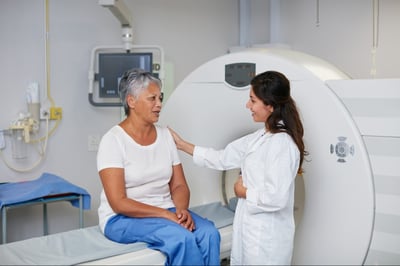FORCE's eXamining the Relevance of Articles for You (XRAY) program looks behind the headlines of cancer news to help you understand what the research means for you.
XRAY is a reliable source of hereditary cancer research-related news and information.
Learn more about the XRAY program
Categories Prevention, Screening
Relevance: Medium


Strength of Science: Medium-High


Research Timeline: Post Approval


Study : More research points to the benefits of pancreatic cancer screening
Relevance: Medium


Strength of Science: Medium-High


Research Timeline: Post Approval


Most relevant for: People undergoing pancreatic cancer screening
People with a family history of pancreatic cancer or those who have an inherited mutation that increases risk may benefit from yearly pancreatic cancer screening. Yearly screening may lead to early diagnosis and longer survival. (Posted 10/8/24)
Read More
Relevance: Medium


Research Timeline: Post Approval


Update : News from the FDA: Updates on breast cancer treatment
Relevance: Medium


Research Timeline: Post Approval


Most relevant for: People with BioZorb markers in breast tissue. People who will have a lumpectomy. People interested in cancer-related podcasts.
The FDA updates the risks of using BioZorb Markers, approves a new imaging drug and shares the Oncology Podcast Series. (Posted 8/16/24)
Este artículo está disponible en español.
Read More
Relevance: Medium-High


Strength of Science: Medium-High


Research Timeline: Human Research


Study : Yearly breast MRI screening improves outcomes for women with inherited BRCA mutations
Relevance: Medium-High


Strength of Science: Medium-High


Research Timeline: Human Research


Most relevant for: People with a BRCA1 or BRCA2 mutation who are considering breast MRI screening
An international research study of yearly breast MRI screening among women with BRCA1 and BRCA2 gene mutations found that BRCA1 carriers who had MRI screenings were less likely to die of breast cancer than those who did not. Additional studies with more BRCA2 mutation carriers are needed to determine if yearly breast MRIs reduce deaths from breast cancer in this group. (Posted 6/24/24)
Este artículo está disponible en español.
Read More
Relevance: Medium


Personal Story : Living a full life with Li-Fraumeni syndrome
Relevance: Medium


Most relevant for: People with Li-Fraumeni syndrome
This XRAY review is about a five-time cancer survivor who has an inherited mutation in the TP53 gene. People with inherited mutations in TP53 have Li-Fraumeni syndrome, which is linked to a very high lifetime risk for many types of cancer. Here we share his inspiring story and provide more information on Li-Fraumeni syndrome. (Posted 4/16/24)
Este artículo está disponible en español.
Read More
Relevance: High


Strength of Science: High


Research Timeline: Post Approval


Study : Genetic testing among people with cancer can find mutations that may affect treatment and prevention
Relevance: High


Strength of Science: High


Research Timeline: Post Approval


Most relevant for: People diagnosed with cancer who have not yet had genetic testing
Despite national guidelines recommending genetic testing, less than 10 percent of eligible patients had genetic testing within two years after their cancer diagnosis. Among those who had testing, 10-30 percent had an inherited mutation that could affect their medical care. (Posted 3/15/2024)
Este artículo está disponible en español.
Read More
Relevance: Medium


Update : News from the FDA– new breast cancer treatment, thermography warning and implant screening updates
Relevance: Medium


Most relevant for: People with HR-positive and HER2-negative metastatic breast cancer. People with silicone breast implants. People considering thermography screening
This XRAY review is a summary of FDA breast cancer updates from July to December 2023. This includes a new drug approval and two consumer updates. (Posted 2/21/24)
Este artículo está disponible en español.
Read More
Update : A breast cancer vaccine for people with an inherited BRCA1, BRCA2 or PALB2 mutation
Most relevant for: People at increased risk for breast cancer undergoing prophylactic bilateral mastectomy due to an inherited mutation in BRCA1, BRCA2 or PALB2. People with TNBC who still have breast cancer after chemotherapy.
A breast cancer vaccine is showing promise in early clinical trials. Initially, the vaccine was tested in people with triple-negative breast cancer (TNBC) who were at high risk for recurrence. Now the vaccine is being tested to lower breast cancer risk among people with an inherited mutation in BRCA1, BRCA2 or PALB2. It is also being tested in people with triple-negative breast cancer who are at high risk for recurrence and are taking the immunotherapy drug Keytruda (pembrolizumab) after completing chemotherapy. (Posted 1/31/24)
Este artículo está disponible en español.
Read More
Relevance: Medium-High


Strength of Science: Medium-High


Research Timeline: Post Approval


Study : H. pylori bacteria infection and risk of stomach cancer in mutation carriers
Relevance: Medium-High


Strength of Science: Medium-High


Research Timeline: Post Approval


Most relevant for: People who are at increased risk for stomach cancer due to an inherited mutation.
The results of a study in Japan show that people with a bacterial infection called H. pylori and an inherited mutation in an ATM, BRCA1, BRCA2 or PALB2 gene have a high risk of stomach cancer. (Posted 1/19/24)
Este artículo está disponible en español.
Read More
Relevance: Medium-High


Strength of Science: Medium-High


Research Timeline: Post Approval


Study : Benefit of pancreatic cancer screening
Relevance: Medium-High


Strength of Science: Medium-High


Research Timeline: Post Approval


Most relevant for: People with an inherited BRCA1 or BRCA2 mutation
Among people with an inherited mutation in a BRCA1 or BRCA2 gene, screening for pancreatic cancer found most cancers at an earlier stage when they could be treated by surgery. Posted 1/17/24)
Este artículo está disponible en español.
Read More
Relevance: Medium


Article : Breast cancer risk for transgender women with inherited mutations
Relevance: Medium


Most relevant for: Transgender women with inherited mutations who are considering or have had gender affirming care
There has been little research on breast cancer risk for transgender women who are at high risk for breast cancer due to an inherited mutation. This review summarizes what we know. (Posted 11/29/23)
Este artículo está disponible en español.
Read More